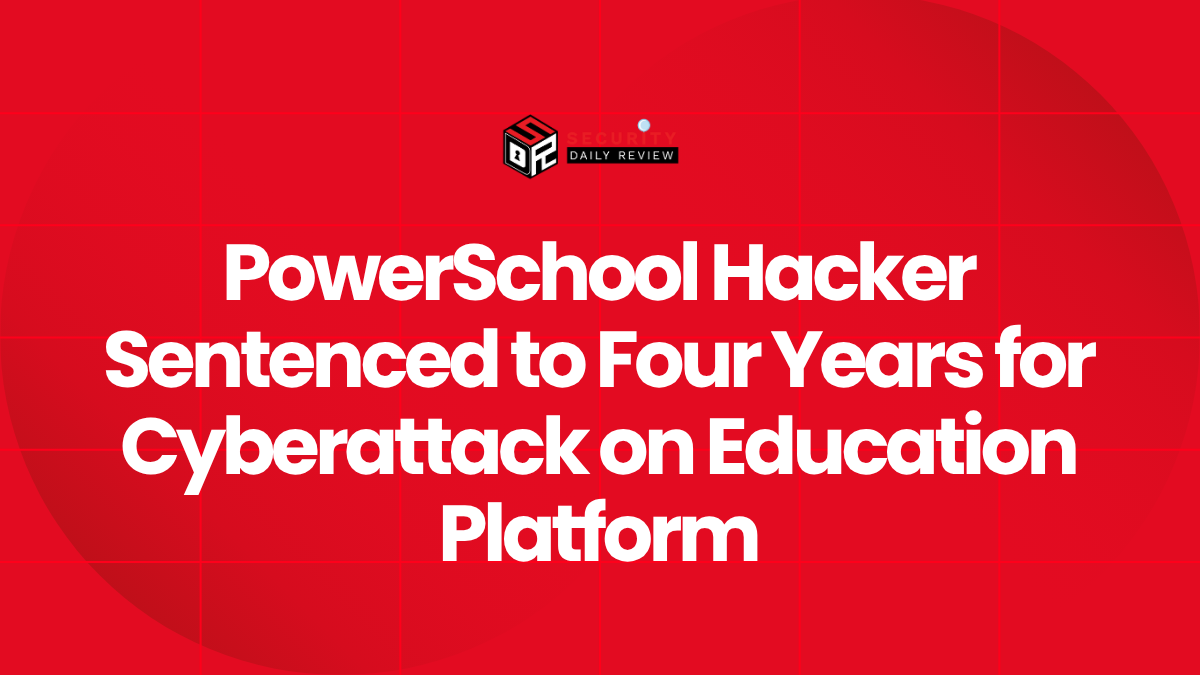The U.S. District Court in Massachusetts has sentenced a 20-year-old college student, Matthew D. Lane, to four years in prison for orchestrating a major cyberattack on PowerSchool, a cloud-based educational software platform used by thousands of K-12 institutions across North America. The sentencing marks the culmination of one of the most extensive breaches of student and teacher data in U.S. history, involving the compromised personal information of over 70 million individuals and a ransom demand exceeding $2.8 million in Bitcoin.
Hacker Compromised PowerSchool’s Systems Using Stolen Credentials
The breach began in December 2024, when Lane and his accomplices exploited stolen credentials obtained from a prior telecommunications data breach. These credentials enabled them to infiltrate PowerSchool’s PowerSource customer support portal. From there, attackers gained unauthorized access to internal systems, including a maintenance tool that allowed the mass exfiltration of sensitive database content.
The attackers downloaded education records from over 6,500 school districts, affecting approximately 62.4 million students and 9.5 million teachers. The stolen information included a wide array of personally identifiable information (PII), such as:
- Full names, email addresses, and phone numbers
- Residential addresses and parent/guardian information
- Social Security numbers and passwords
- Medical history and other sensitive data
PowerSchool, based in Folsom, California, provides digital tools for educational institutions and supports more than 18,000 customers worldwide.
Ransom Demands and Extortion Under a False Identity
By December 28, 2024, the hackers issued a ransom demand for $2.85 million in Bitcoin via anonymous communications channels like encrypted messages and burner email accounts. Posing as the well-known threat actor group “ShinyHunters,” the hackers threatened to leak the stolen data if the ransom was not met. They even invoked aggressive language in negotiations, warning PowerSchool that they would “destroy your company and bankrupt it to the point of no absolute return.”
While PowerSchool did pay a ransom to prevent the immediate release of the sensitive data, the exact amount paid remains undisclosed. Despite receiving the payment, Lane and his co-conspirators allegedly continued to attempt further extortion—contacting individual school districts to demand additional payments.
Court records also show that prior to the PowerSchool breach, Lane attempted to extort another telecommunications firm using similar tactics—threatening to leak its data unless he was paid $200,000. When the company questioned the authenticity of his claims, Lane insisted they held the only copy of the stolen data and implied violent consequences for employees if the ransom was not met.
Sentencing Includes Restitution, Monetary Penalties, and Supervised Release
U.S. District Judge Margaret R. Guzman sentenced Lane to four years in prison followed by three years of supervised release. Although the U.S. Attorney’s Office initially sought a seven-year sentence, citing Lane’s greed, technical sophistication, and disregard for the safety of millions of individuals, the final term was considerably less than the maximum possible. In addition to the prison sentence, Lane was ordered to:
- Pay over $14 million in restitution for damages caused
- Forfeit assets including $160,981 and Monero cryptocurrency wallets
- Pay a $25,000 court-imposed fine
This sentencing reflects growing judicial accountability for cybercrime involving widespread data breaches, particularly in sectors like education that are ill-equipped to defend high-value, high-volume PII.
Prior Incidents and Legal Fallout for PowerSchool
The December 2024 attack was not the first time PowerSchool’s systems were compromised via unauthorized access. According to internal investigations, the PowerSource support portal was previously accessed using similar credentials in August and September 2024. However, cybersecurity firm CrowdStrike, which was enlisted to investigate, could not definitively prove that Lane or his group were responsible for those earlier intrusions.
In the wake of the incident, Texas Attorney General Ken Paxton filed a lawsuit against PowerSchool, accusing the company of failing to safeguard the data of Texas school districts and misrepresenting its security protocols to customers. The breach drew widespread criticism from parents, educators, and policymakers concerned about the vulnerability of student data in centralized cloud systems.
Courtroom Statements Reveal a Contrite but Troubled Defendant
During his sentencing, Lane expressed remorse, telling the court, “I robbed actual people and their families of their sense of security.” According to reports, Lane broke down in tears and claimed he had become sober not just from drugs but also from the internet.
Lane, who was a student at Assumption University in Worcester, Massachusetts, was convicted on four federal charges: unauthorized access to protected computers, cyber extortion, cyber extortion conspiracy, and aggravated identity theft.
Broader Implications for Cybersecurity Resilience in Education
The PowerSchool breach and subsequent conviction of its perpetrator underscore the urgent need for the education sector to enhance cybersecurity postures. Three key lessons can be drawn:
- Third-Party Risk Management : The breach originated from compromised credentials linked to a subcontractor. Education platforms must implement stronger vetting and access controls across their supply chains.
- Incident Response Preparedness : Despite having paid a ransom, PowerSchool continued to experience extortion attempts. This highlights the need for robust incident response plans and post-breach containment strategies.
- Legal Precedents and Deterrents : The sentencing of Matthew Lane sets a precedent and demonstrates that cybercriminals—regardless of age or academic status—will face significant legal consequences.
As cyber threats targeting critical infrastructure like educational systems grow more prevalent, the PowerSchool case serves as a cautionary tale for both cybersecurity professionals and software providers.









